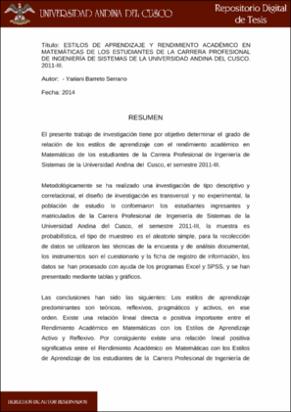| dc.contributor.advisor | Suárez Sánchez, Richard | |
| dc.contributor.author | Barreto Serrano, Yariani | |
| dc.date.accessioned | 2016-07-06T13:19:50Z | |
| dc.date.available | 2016-07-06T13:19:50Z | |
| dc.date.issued | 2014-04-28 | |
| dc.identifier.uri | https://hdl.handle.net/20.500.12557/314 | |
| dc.description.abstract | El presente trabajo de investigación tiene por objetivo determinar el grado de relación de los estilos de aprendizaje con el rendimiento académico en Matemáticas de los estudiantes de la Carrera Profesional de Ingeniería de Sistemas de la Universidad Andina del Cusco, el semestre 2011-III.
Metodológicamente se ha realizado una investigación de tipo descriptivo y correlacional, el diseño de investigación es transversal y no experimental, la población de estudio lo conformaron los estudiantes ingresantes y matriculados de la Carrera Profesional de Ingeniería de Sistemas de la Universidad Andina del Cusco, el semestre 2011-III, la muestra es probabilística, el tipo de muestreo es el aleatorio simple, para la recolección de datos se utilizaron las técnicas de la encuesta y de análisis documental, los instrumentos son el cuestionario y la ficha de registro de información, los datos se han procesado con ayuda de los programas Excel y SPSS, y se han presentado mediante tablas y gráficos.
Las conclusiones han sido las siguientes: Los estilos de aprendizaje predominantes son teóricos, reflexivos, pragmáticos y activos, en ese orden. Existe una relación lineal directa o positiva importante entre el Rendimiento Académico en Matemáticas con los Estilos de Aprendizaje Activo y Reflexivo. Por consiguiente existe una relación lineal positiva significativa entre el Rendimiento Académico en Matemáticas con los Estilos de Aprendizaje de los estudiantes de la Carrera Profesional de Ingeniería de Sistemas, el semestre 2011-III. | es_PE |
| dc.description.abstract | This investigation has objective to determine the degree of relationship between the learning styles with academic performance in mathematics of Systems Engineering Career students of Andean University of Cusco (UAC), the 2011-III semester.
The Methodology of the research is descriptive and correlational , the design is cross-sectional and non-experimental, the population consisted of beginning students of Systems Engineering Career of Andean University of Cusco, the 2011- III semester, the sample is probabilistic, the type of sampling is simple random sampling, were used techniques the survey analysis and document analysis for data collection, the instruments are the questionnaire and the registration from information, the data were processed with Excel and SPSS programs, and presented with tables and graphs.
The conclusions were as follows: The predominant learning styles are theoretical, Reflective, pragmatic and active, in that order. There is a direct or positive significant linear relationship between academic performance in Mathematics with the Active Learning Style and the Reflective Learning Style. Therefore there is a significant positive linear relationship between Academic Performance in Mathematics with the Learning Styles of students Systems Engineering Career, the 2011- III semester. | en_US |
| dc.description.uri | Tesis | es_PE |
| dc.format | application/pdf | es_PE |
| dc.language.iso | spa | es_PE |
| dc.publisher | Universidad Andina del Cusco | es_PE |
| dc.rights | info:eu-repo/semantics/restrictedAccess | es_PE |
| dc.source | Universidad Andina del Cusco | es_PE |
| dc.source | Repositorio Institucional - UAC | es_PE |
| dc.subject | Aprendizaje | es_PE |
| dc.subject | Estilos de aprendizaje | es_PE |
| dc.subject | Rendimiento académico | es_PE |
| dc.title | Estilos de aprendizaje y rendimiento académico en matemáticas de los estudiantes de la Carrera Profesional de Ingeniería de Sistemas de la Universidad Andina del Cusco. 2011-III. | es_PE |
| dc.type | info:eu-repo/semantics/masterThesis | es_PE |
| thesis.degree.name | Maestro en Docencia Universitaria | es_PE |
| thesis.degree.grantor | Universidad Andina del Cusco. Escuela de Posgrado | es_PE |
| thesis.degree.level | Maestría | es_PE |
| thesis.degree.discipline | Docencia Universitaria | es_PE |

